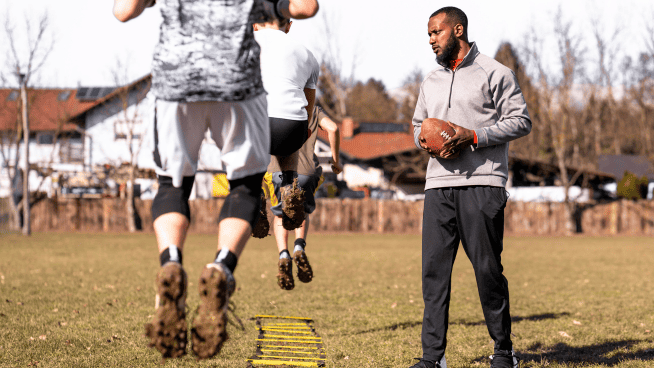Are You at Risk for an Eating Disorder?

Twelve-time Olympic medalist and world record-holder Dara Torres is one of the many athletes who has struggled with an eating disorder.
As an athlete , you’ve seen teammates deal with broken bones, torn muscles and sprained ankles. You couldn’t have stopped them from making that wrong turn or misstep, but what if you could save them from something even bigger?
In the United States, 20 million women and 10 million men will suffer from an eating disorder at some point in their lives. Unlike common sport injuries like ACL tears and sore joints, it’s impossible to look at someone and know that they are at risk for an eating disorder. Disordered eating can lead to health complications, hospitalization and sometimes even death; and there is a good chance that someone on your team is suffering, or will suffer, from it. Knowing the warning signs and seeking help could help you potentially save a life. (See also Athletes and Eating Disorders.)
Not everyone at risk displays the classic signs and symptoms of a full-blown eating disorder—brittle hair and nails, anemia, reduced muscle mass, erosion of tooth enamel, electrolyte imbalance, and blood pressure and cholesterol abnormalities. Eating disorders aren’t subjective either. Contrary to popular belief, an individual can be at risk for, or have, an eating disorder regardless of her body size. The simplest way to tell if someone is at risk is to look at her behavior. If she frequently misses practice or exhibits unusual eating habits, she might have an eating disorder.
Do any of the following statements or behaviors describe you or someone you know?
- “I eat alone or hide food because I’m ashamed about what or how much I eat.”
- “I’m terrified about being overweight (or underweight), and I frequently think about the fat that I have on my body.”
- “I have a strong desire to change the way my body looks. If I can achieve my goal weight, I will be happier.”
- “When I exercise, I usually think about the number of calories I’m burning.”
- “I think about the food I eat almost all the time, and I pay close attention to what others eat.”
- “Sometimes I start eating and feel like I cannot stop.”
- “I have vomited or taken laxatives to get rid of the food I ate.”
- “I have a personal or genetic history of eating disorders, depression, anxiety or addiction.”
- “I am always on some type of diet and feel guilty when I cheat.”
- “I feel pressure from my family, friends or society to change the way I look.”
If any of hese statements describe you, you may be at risk for developing an eating disorder. Diagnosis involves physical, psychological and behavioral assessments by a health care professional who specializes in eating disorders. Although you may not have a severe case, it is never too soon to get help. And help cannot come simply from reading this article. Sadly, only one in ten men and women with eating disorders receive treatment; and delaying treatment can lead to severe health complications.
To reduce your chance of developing an eating disorder, practice the following healthy eating behaviors.
Eat Mindfully
Enjoy the appearance, smell, texture and taste of your food. Pay attention to your hunger cues and eat until you feel pleasantly satisfied.
Food is Fuel
Think about supplying your body with the quality fuel it needs to reach its performance potential and achieve optimal health. You wouldn’t run your car on empty, so don’t run your body on empty either.
Throw out the Bathroom Scale
A number on a scale should have no influence on your self-worth. Feel good about the unique qualities, abilities and talents that you have to offer those around you.
Criticize Advertisements that Promote Unrealistic Body Standards
When you see these ads, don’t ask “What’s wrong with me?” Instead say, “What’s wrong with this message?”
Focus on Feeling and Performance
Train your body to perform and realize that successful athletes and healthy human beings come in many shapes and sizes. Focus on how you feel during exercise and throughout the day. (Read Balancing Your Training Diet.)
Be Nice to Yourself
Stop making negative comments about your body. Your body is the greatest gift you’ve ever received. Dress in comfortable clothes and celebrate all the wonderful experiences your body allows you to have.
Remember, with eating disorders you cannot rely on self-help alone, nor can you provide your loved one with all of the information he needs. It’s important to seek help immediately. The National Eating Disorders Association is a great place to find support. They offer a toll-free confidential hot line, online chat rooms, and many opportunities to learn about eating disorders. If you think that you or someone you know is at risk for an eating disorder, do not stay quiet! Your decision to speak up could save a life.
RECOMMENDED FOR YOU
MOST POPULAR
Are You at Risk for an Eating Disorder?

Twelve-time Olympic medalist and world record-holder Dara Torres is one of the many athletes who has struggled with an eating disorder.
As an athlete , you’ve seen teammates deal with broken bones, torn muscles and sprained ankles. You couldn’t have stopped them from making that wrong turn or misstep, but what if you could save them from something even bigger?
In the United States, 20 million women and 10 million men will suffer from an eating disorder at some point in their lives. Unlike common sport injuries like ACL tears and sore joints, it’s impossible to look at someone and know that they are at risk for an eating disorder. Disordered eating can lead to health complications, hospitalization and sometimes even death; and there is a good chance that someone on your team is suffering, or will suffer, from it. Knowing the warning signs and seeking help could help you potentially save a life. (See also Athletes and Eating Disorders.)
Not everyone at risk displays the classic signs and symptoms of a full-blown eating disorder—brittle hair and nails, anemia, reduced muscle mass, erosion of tooth enamel, electrolyte imbalance, and blood pressure and cholesterol abnormalities. Eating disorders aren’t subjective either. Contrary to popular belief, an individual can be at risk for, or have, an eating disorder regardless of her body size. The simplest way to tell if someone is at risk is to look at her behavior. If she frequently misses practice or exhibits unusual eating habits, she might have an eating disorder.
Do any of the following statements or behaviors describe you or someone you know?
- “I eat alone or hide food because I’m ashamed about what or how much I eat.”
- “I’m terrified about being overweight (or underweight), and I frequently think about the fat that I have on my body.”
- “I have a strong desire to change the way my body looks. If I can achieve my goal weight, I will be happier.”
- “When I exercise, I usually think about the number of calories I’m burning.”
- “I think about the food I eat almost all the time, and I pay close attention to what others eat.”
- “Sometimes I start eating and feel like I cannot stop.”
- “I have vomited or taken laxatives to get rid of the food I ate.”
- “I have a personal or genetic history of eating disorders, depression, anxiety or addiction.”
- “I am always on some type of diet and feel guilty when I cheat.”
- “I feel pressure from my family, friends or society to change the way I look.”
If any of hese statements describe you, you may be at risk for developing an eating disorder. Diagnosis involves physical, psychological and behavioral assessments by a health care professional who specializes in eating disorders. Although you may not have a severe case, it is never too soon to get help. And help cannot come simply from reading this article. Sadly, only one in ten men and women with eating disorders receive treatment; and delaying treatment can lead to severe health complications.
To reduce your chance of developing an eating disorder, practice the following healthy eating behaviors.
Eat Mindfully
Enjoy the appearance, smell, texture and taste of your food. Pay attention to your hunger cues and eat until you feel pleasantly satisfied.
Food is Fuel
Think about supplying your body with the quality fuel it needs to reach its performance potential and achieve optimal health. You wouldn’t run your car on empty, so don’t run your body on empty either.
Throw out the Bathroom Scale
A number on a scale should have no influence on your self-worth. Feel good about the unique qualities, abilities and talents that you have to offer those around you.
Criticize Advertisements that Promote Unrealistic Body Standards
When you see these ads, don’t ask “What’s wrong with me?” Instead say, “What’s wrong with this message?”
Focus on Feeling and Performance
Train your body to perform and realize that successful athletes and healthy human beings come in many shapes and sizes. Focus on how you feel during exercise and throughout the day. (Read Balancing Your Training Diet.)
Be Nice to Yourself
Stop making negative comments about your body. Your body is the greatest gift you’ve ever received. Dress in comfortable clothes and celebrate all the wonderful experiences your body allows you to have.
Remember, with eating disorders you cannot rely on self-help alone, nor can you provide your loved one with all of the information he needs. It’s important to seek help immediately. The National Eating Disorders Association is a great place to find support. They offer a toll-free confidential hot line, online chat rooms, and many opportunities to learn about eating disorders. If you think that you or someone you know is at risk for an eating disorder, do not stay quiet! Your decision to speak up could save a life.










